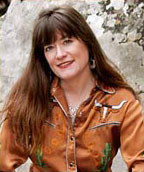


Here is a review from Palm Beach Post for the book Public Cowboy No. 1: The Life and Times of Gene Autry by Holly George-Warren.
Self-Made Legend
By Scott Eyman
July 1, 2007
![]()
PUBLIC COWBOY NO. 1: The Life and Times of Gene Autry, by Holly George-Warren. Oxford University Press; 406 pages; $28.

In every generation, there are stars whose impact on succeeding generations can by reduced to several questions, which are usually rhetorical in nature: "Huh? You're kidding, right? What were they thinking?"
Take Gene Autry. He was a little dumpling of a guy who couldn't act at all, even by the severely limited standards of B-westerns – Autry made Roy Rogers look like Montgomery Clift.
B-westerns were made for predominantly juvenile audiences in predominantly rural America.
Autry's films combined lots of oafish humor, mostly rube, and two or three songs, mostly forgettable. As far as action scenes went, he could ride a little, as long as the horse was moving in a straight line, but had to be heavily doubled for everything else.
What Autry could do was sing, in a slightly quavery but pleasant voice whose style owed a lot to Jimmie Rodgers, the Singing Brakeman. Autry sang what was known at the time as hillbilly music, which has come to be known by the more polite, not to mention dignified, term country and western.
But in spite of a skill set that seems severely limited to even a casual observer, Gene Autry was a very big star from the time he walked in front of a camera in the mid-1930s, to when he finally retired from show business in 1962.
And now we have Holly George-Warren's very valuable biography – from no less than Oxford University Press! – which conclusively proves that that round, little cowboy was considerably more interesting than he appeared.
Orvon Grover Autry was raised poor in Tioga, Texas. His father was a bad-check artist and jailbird, but Autry was a good citizen, starting out as a telegrapher, then a singer who carved out a public on the radio in the Midwest. Making the transition to movies in 1934, he proved to be a genius at selling Gene Autry.
He began investing in radio stations before World War II and, after the war, began buying TV stations, with the help of his friend and fellow Texan Lyndon Johnson.
Autry made around eight movies a year, but they took only about two weeks apiece to make, which left him plenty of time to go on the road with rodeos and personal appearances, where he made at least as much money as he did from Republic Pictures. By 1940, Autry was fourth on the list of box office stars, just behind Mickey Rooney, Spencer Tracy and Clark Gable.
At the same time, he was sustaining a recording career - probably how most people remember him now, with hits like Rudolph the Red-Nosed Reindeer – and a popular radio show that ran for 20 years. By the time B-westerns were killed off by television, Autry had racked up five years of his own TV series. Then he got the franchise for the team that became the California Angels, and the man who had always been available for a pickup game of baseball on film sets was truly in hog heaven.
Personally, Autry had little truck with the pious pronouncements about moral behavior he transmitted to his youthful audiences. He was an enthusiastic adulterer for almost his entire long marriage, with a special predilection for his leading ladies and the female members of his fan club. After the war - he served in the Army Air Corps - he developed a drinking problem that escalated to the point where he lost his driver's license.
On the positive side of the balance sheet, Autry was extremely loyal, extremely generous, and a good man to have in your corner. In his right-hand pocket he carried brand-new $100 bills, and in his left-hand pocket he carried brand-new $50 bills, and he was always ready to bring out either pile to help out an old stuntman or rodeo rider who was up against it. And when Johnny Cash was arrested for transporting amphetamines in 1965, one of the first people he called was Autry, who pressed some buttons and helped get Cash off with a fine instead of jail time.
It's entirely possible that Autry's unprepossessing appearance worked to his professional advantage. For the Saturday matinee kids, he was far more approachable than the leathery austerities of John Wayne, Gary Cooper or Randolph Scott. Autry looked like a boy until he was well into middle age. "Working with numbers was what I did best," he would remember as an old man. "What I did less well was sing, act and play the guitar."
George-Warren's book is cleanly written and solidly researched, with the cooperation of Autry's estate. The only real drawback is that the book basically ends with his retirement from show business. I would have loved to read more about his business life in baseball and broadcasting.
When Autry died in 1998 at the age of 91, Fortune magazine estimated he was worth $320 million. His money had already built the superb Autry Museum of the Western Heritage in Los Angeles. A few years after that, the California Angels won the World Series.
Somewhere, the old cowboy was smiling.